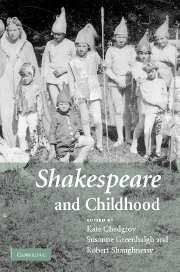Book contents
- Frontmatter
- Contents
- Acknowledgements
- Notes on contributors
- Note on the text
- 1 Introduction
- PART 1 SHAKESPEARE'S CHILDREN
- PART 2 CHILDREN'S SHAKESPEARES
- 8 Introduction: reinventing Shakespearean childhoods
- 9 Play's the thing: agency in children's Shakespeares
- 10 Shakespeare in the Victorian children's periodicals
- 11 Growing up with Shakespeare: the Terry family memoirs
- 12 Shakespeare in the company of boys
- 13 Dream children: staging and screening childhood in A Midsummer Night's Dream
- 14 Shakespeare (')tween media and markets in the 1990s and beyond
- APPENDICES
- Index
10 - Shakespeare in the Victorian children's periodicals
Published online by Cambridge University Press: 22 September 2009
- Frontmatter
- Contents
- Acknowledgements
- Notes on contributors
- Note on the text
- 1 Introduction
- PART 1 SHAKESPEARE'S CHILDREN
- PART 2 CHILDREN'S SHAKESPEARES
- 8 Introduction: reinventing Shakespearean childhoods
- 9 Play's the thing: agency in children's Shakespeares
- 10 Shakespeare in the Victorian children's periodicals
- 11 Growing up with Shakespeare: the Terry family memoirs
- 12 Shakespeare in the company of boys
- 13 Dream children: staging and screening childhood in A Midsummer Night's Dream
- 14 Shakespeare (')tween media and markets in the 1990s and beyond
- APPENDICES
- Index
Summary
Shakespeare's role in the formation of English national identity has already been well established by historians of Shakespeare reception, who have demonstrated that Shakespeare became recognized as England's ‘national poet’ in the eighteenth century, while under the Romantics this flourishing appreciation was magnified into that heightened reverence that George Bernard Shaw would later dub ‘Bardolatry’. What has been generally overlooked, however, is the means by which this growing sense of Shakespeare's centrality and importance was transmitted in the nineteenth century beyond the purview of gentlemen, scholars and poets to members of society who might never choose to read poetry or literary criticism. As one component in a generalized popularization of Shakespeare during the Victorian era, the Victorian children's periodicals constitute a significant but unappreciated mechanism contributing to the rise of a popular Shakespeare. In return, Shakespeare as he was depicted in these periodicals helped to shape a nascent sense of national identity among England's youth, embracing adventure, exploration and conquest for boys, self-sacrificing daughterhood – and eventually motherhood – for girls.
The politicized nature of children's Shakespeare in the Victorian era is not solely a product of the periodicals, but because children's periodicals are largely a Victorian phenomenon, and especially because they reached a wider segment of Victorian society who would not have purchased the often lavishly illustrated, expensive books on the same subject, these periodicals merit investigation.
- Type
- Chapter
- Information
- Shakespeare and Childhood , pp. 153 - 168Publisher: Cambridge University PressPrint publication year: 2007
- 1
- Cited by

